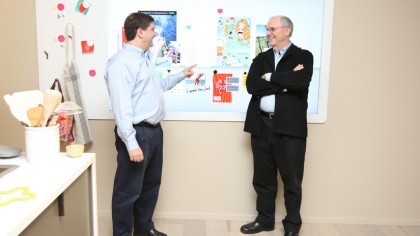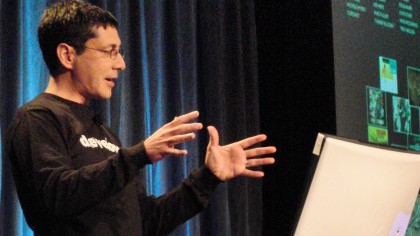Who's who at Microsoft (and what they're doing next)
Who has a new job at Microsoft and what does it mean for next year's products?
When Microsoft's chief research and strategy officer Craig Mundie decided he would retire come 2014 (he's currently Ballmer's senior advisor), Rudder took on most of Mundie's job, including Microsoft Research, Trustworthy Computing and the Technology Policy Group.

Ballmer credited Mundie with "tighten[ing] the connection between MSR and the devices and services we are bringing to market" - a pat on the back for helping to get Microsoft-developed technology into products like Kinect, Xbox One, Surface, Office, Windows Phone and Bing over the last couple of years.
Now Microsoft has split what used to be the Advanced Strategy and Research Group in half. Harry Shum, the head of Bing Engineering who used to run MSR in China takes over research and the other tasks. While Rudder gets a new title of executive vice president for advanced strategy which sounds a little like the chief software architect role Bill Gates took on when he handed the CEO job to Ballmer.
"It is critical that a senior leader is accountable for certain key, cross company technology initiatives," said Ballmer - without naming them.
Mysterious future plans
There's even less detail on what Dean Hachamovitch, the head of Internet Explorer for the last nine years, is going to do next, although he announced on the IE blog that he's "excited to start a new team to take on something new".
The rumour is that he's heading up a group to analyse how people use Microsoft products in order to come up with improvements and new ideas, which sounds like something that belongs in Rudder's group.

Rudder and Hachamovitch aren't the only senior Microsoft executives working on mysterious future plans. Rick Rashid was a professor at Carnegie Mellon University doing research in everything from computer vision, networks and security to operating systems before he came to Microsoft; he developed the Mach OS, which is (ironically) what the Mac OS X kernel is based on (Apple's former chief software technology officer AvieTevanian also worked on Mach).
Are you a pro? Subscribe to our newsletter
Sign up to the TechRadar Pro newsletter to get all the top news, opinion, features and guidance your business needs to succeed!
Former Microsoft CTO Nathan Myhrvold persuaded Rashid to come to Microsoft in 1991 to run Microsoft Research and "boldly go where no one has gone before" - you can read the original pitch (PDF) for the group here. He ran Microsoft Research for 22 years. But this July he joined the Operating Systems Engineering Group, which spans OS work across Microsoft's product line.
Crossing the Threshold
That means that what comes after Windows 8 (and the Threshold update that's rumoured to bring common experiences to Windows, Windows Phone and Xbox in 2015) could be something that includes a lot more of the discoveries from Microsoft's many experimental operating systems like Singularity, Verve, Barrelfish and Drawbridge.
Having Rashid in the OS group suggests Microsoft wants to do more than cherry pick ideas from research for building future versions of Windows. Microsoft had the idea of running Windows on an ARM chip before the iPad ever came out, but it was slow off the mark and, as everyone knows, lost the tablet market to Apple.
As well as getting all the different product teams working on a single Microsoft strategy, Microsoft needs to be ahead of the next big thing rather than running to catch up. These new teams look like the way Microsoft is working on that.
- Now why not read Best free Microsoft Office alternatives: 5 suites to save you money
Mary (Twitter, Google+, website) started her career at Future Publishing, saw the AOL meltdown first hand the first time around when she ran the AOL UK computing channel, and she's been a freelance tech writer for over a decade. She's used every version of Windows and Office released, and every smartphone too, but she's still looking for the perfect tablet. Yes, she really does have USB earrings.